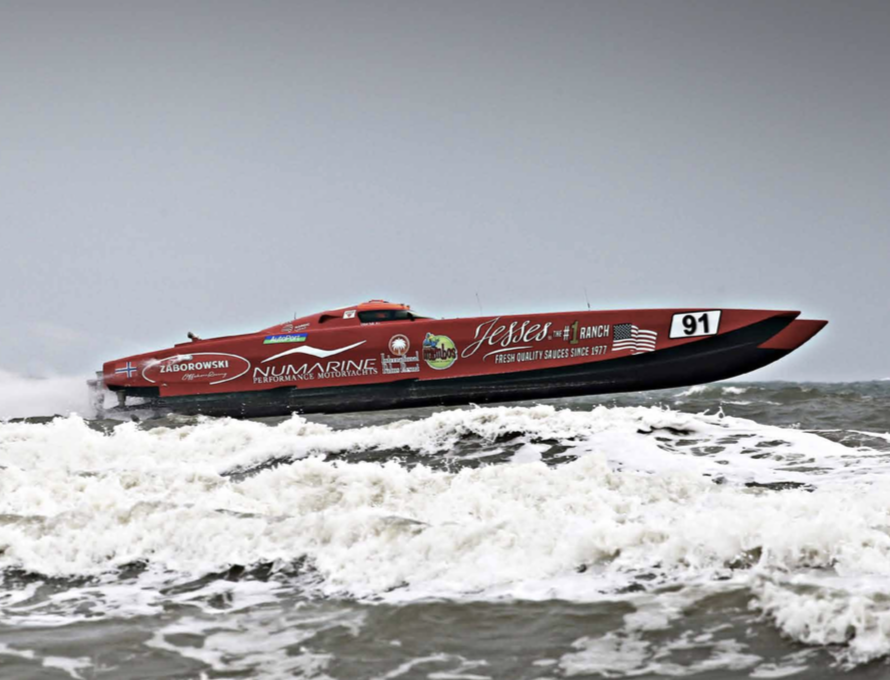This website uses cookies so that we can provide you with the best user experience possible. Cookie information is stored in your browser and performs functions such as recognising you when you return to our website and helping our team to understand which sections of the website you find most interesting and useful.
Four-time powerboating world champion Miles Jennings explains why this thrilling sport is no longer just for the elite few
By Michelle Johnson | 15 July 2019 | Cars & Yachts
Powerboating champion Miles Jennings tells Tempus about his need for speed

With speeds surpassing 160mph, furious competition from the world’s best racers and the sea as your racetrack, it’s no surprise that offshore powerboat racing is heralded as the Formula 1 of boating. And in fact, for four-time world champion Miles Jennings, powerboating more than equals any Grand Prix for excitement and adrenaline, eccentric characters and sheer sex appeal.
“In the 1960s, some very bright, colourful characters used to compete – including notorious fugitive Lord Lucan. We’ve had film stars, as well as British royalty and lots of lords and ladies,” he says. “To be a powerboater you need a passion for water, an understanding of the sea and a need for speed. Powerboating is akin to rallying, as the surface of the water is constantly moving so although we have a racetrack of sorts, it’s constantly changing, never the same twice. One day it can be flat and calm and the next there could be 6ft waves.”
The drama of the sport is one of its main points of appeal for Jennings, who has been likened to Formula 1 legend James Hunt for his thrill-seeking sportsmanship as much as his long blonde hair, despite the risks that it can entail.
“Powerboating is considered the most dangerous sport on the planet, for the number of fatalities against the number of competitors,” he explains. “I’ve lost a number of friends over the years in the sport – even Stefano Casiraghi was tragically killed when his boat flipped at high speed.”
Casiraghi was the husband of Princess Caroline of Monaco (now Princess of Hanover), the eldest child of Prince Ranier III of Monaco and Hollywood star-turned- princess Grace Kelly. He was known as a titan of business and speedboat racing – he set a world speed record as the world champion of offshore powerboating – and his death on 3 October 1990 at the age of 30 sent shockwaves through the international press. His death inspired new, more stringent safety laws in both boat design and judging the waves.
“The sport is much safer now” Jennings explains. “The introduction of Kevlar safety cells has been a game- changer for 100mph-plus racing – this is the cockpit the driver sits in, which has to pass impact testing, much the same as with Formula 1 cars. In the early days you’d race without a cell, so if the boat turned over at high speed that could easily lead to disaster, as the water is like concrete when you’re racing fast. Now you’ve got 1in thick Lexon glass from a F16 fighter jet, a six-point harness and bottled air so, in the event of a rollover or a flip, the chances of survival are dramatically improved.”
But despite the extreme nature of powerboat racing, Jennings is pleased the sport is becoming more accessible to fans. “We’re an island nation, therefore powerboating is in our blood; it’s in our DNA,” he says. “And it’s not an ageist sport. You can start at 16 and still keep running in your 60s, as long as you’re fit – although you may not take the knocks and bruises. It can be quite brutal.
“Powerboating was perceived as an elitist ‘playboy’ sport, and in fact our most famous offshore race is still the Cowes-Torquay-Cowes Race, run by Sir Max Aitken.” Canadian-British aristocrat Aitken was an ace fighter pilot during World War II, later known as a Conservative politician and media baron after entering the family newspaper business and becoming a director of the Express Group (including the Daily Express).
“Sir Max started this as a fun race for his wealthy friends in 1961, with the race stretching from his home in Cowes to his holiday home in Teignmouth. From the 1960s to early ’80s, powerboating became known as an exclusive sport for the wealthiest,” he says. “But the advent of smaller-class boats powered by outboard motors meant that husband-and-wife teams, as well as the slightly less affluent, were able to compete as the sport became more affordable encouraging people to be weekend warriors.”
Just as motorsport’s Formula 1 and Formula 3 are a world apart in terms of driving skills and technical car spec, there is a marked difference between these teams and the world championship contenders.
“An absolute beginner could join the ranks in a Class Three boat, using small single-engine 20ft boats running 70mph with around 200 hp, and which could easily be bought for less than £20,000 with running costs of £10,000 per year,” he explains. “To put this into perspective, the 160mph Class One boat that I race has 2200 horsepower, and would cost upwards of £500,000, with £150,000-200,000 running cost per season.”
Jennings says that a major appeal of powerboat racing is its inclusive nature. “If you’re after an action-packed sport where you can go away for a weekend, choose powerboating. British seaside resorts where offshore races take part are great for a weekend away – the whole family can really enjoy it,” he says, citing highlights of the season as the British UKOPRA Powerboat Series meets in Bournemouth (7-9 June) or Guernsey Gold Cup (5-7 July) or Cowes Torquay (23-25 August). “Powerboat racing is a great way to test yourself – man against the elements – and with both speed and navigation it’s a phenomenal challenge.”






